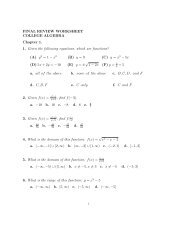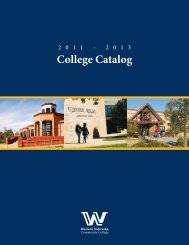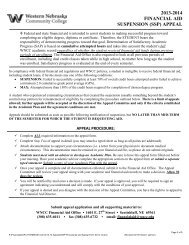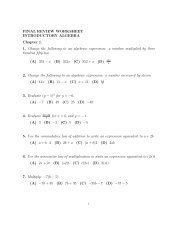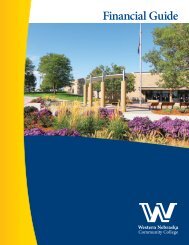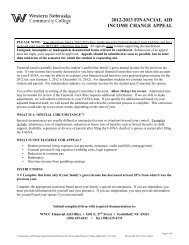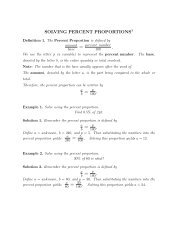WNCC 2010 Self-Study Report - Western Nebraska Community ...
WNCC 2010 Self-Study Report - Western Nebraska Community ...
WNCC 2010 Self-Study Report - Western Nebraska Community ...
Create successful ePaper yourself
Turn your PDF publications into a flip-book with our unique Google optimized e-Paper software.
to create a bond. Many courses are designed to contain elements of awareness and ethics, and<br />
organized athletics, residence life staff members, and other groups also seek to engage students.<br />
The integrity of the College is evident to constituents through the published minutes of meetings of<br />
the Board of Governors and other council and committees, as well as through advisory board<br />
meetings, civic and charitable activities, the structure and actions of the <strong>WNCC</strong> Foundation,<br />
collegiate athletics, visits to County Commissioner meetings throughout the service area, public<br />
service by employees and students, and through coverage by the local news media. To uphold the<br />
mission and confirm integrity, <strong>WNCC</strong>’s policies and procedures are closely monitored by the<br />
President and Cabinet members and the College attorney. <strong>WNCC</strong> has formal statements about<br />
academic integrity in the catalog and a brief statement on every course syllabus.<br />
Internal Constituencies and the Institution<br />
The WCCA Board of Governors<br />
As elected officials responsible to the constituents of the expansive College district, the students,<br />
the faculty and staff, and the state of <strong>Nebraska</strong>, it is imperative that the Board of Governors of the<br />
<strong>Western</strong> <strong>Community</strong> College Area (Board) maintain integrity and credibility in the governance of<br />
<strong>Western</strong> <strong>Nebraska</strong> <strong>Community</strong> College. The Board’s historical record with maintaining its<br />
responsibility is impeccable.<br />
<strong>Nebraska</strong> state law provides that the College Area be divided into five electoral districts that are<br />
nearly equal in population and provides that two members be elected from each district. One<br />
member is elected at-large from the entire district. Board members are elected for four-year terms<br />
with a proportional number of members being elected every two years to assure continuity. In<br />
addition, the Board provides for ex-officio membership on the Board for faculty and students from<br />
each campus, for a total of three student members and three faculty members. The ex-officio<br />
memberships provide two-way communication from these two vital segments of the internal public.<br />
Board members are oriented to the College, to the Board, and to “boardsmanship” when members<br />
first join the Board by incumbent Board members, executive administrators, and at special times,<br />
national experts. Board members are encouraged to take part in the <strong>Nebraska</strong> <strong>Community</strong> College<br />
Association, the Association of <strong>Community</strong> College Trustees, and other related professional<br />
organizations. The Board has a long history of members participating in these organizations<br />
As matter of law, policy, and practice, the Board conducts meeting in accordance with <strong>Nebraska</strong>’s<br />
open meeting requirements. Particularly, this means that the Board provides adequate public<br />
notice to its constituents of the time and place of the meeting, along with a preliminary agenda.<br />
Interested parties are encouraged to attend to speak on issues or concerns and provide input to<br />
the Board members for their deliberation. Further, the Board conducts all voting on issues in open<br />
meetings. Executive sessions are only used for the purpose of protecting the privacy of<br />
individuals, collective bargaining discussions, or briefing the Board on litigation proceedings.<br />
Additionally, all meetings are conducted following established Board policy and Robert’s Rules of<br />
Order. Board policy can only be changed by two-thirds vote and must go through a thirty-day<br />
waiting period.<br />
As an operational practice, the Board asks the College attorney to be present for all Board<br />
meetings in order to provide assistance in the interpretation of state and federal law, legal<br />
<strong>Western</strong> <strong>Nebraska</strong> <strong>Community</strong> College Page 57



